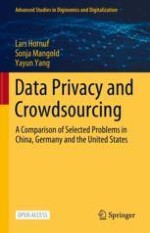This open access book describes the most important legal sources and principles of data privacy and data protection in China, Germany and the United States. The authors collected privacy statements from more than 400 crowdsourcing platforms, which allowed them to empirically evaluate their data privacy and data protection practices. The book compares the practices in the three countries and develops empirically-grounded policy recommendations.
A profound analysis on workers´ privacy in new forms of work in China, Germany, and the United States.
Prof. Dr. Wolfgang Däubler, University of Bremen
This is a comprehensive and timely book for legal and business scholars as well as practitioners, especially with the increasingly important role of raw data in machine learning and artificial intelligence.
Professor Mingfeng Lin, Georgia Institute of Technology
